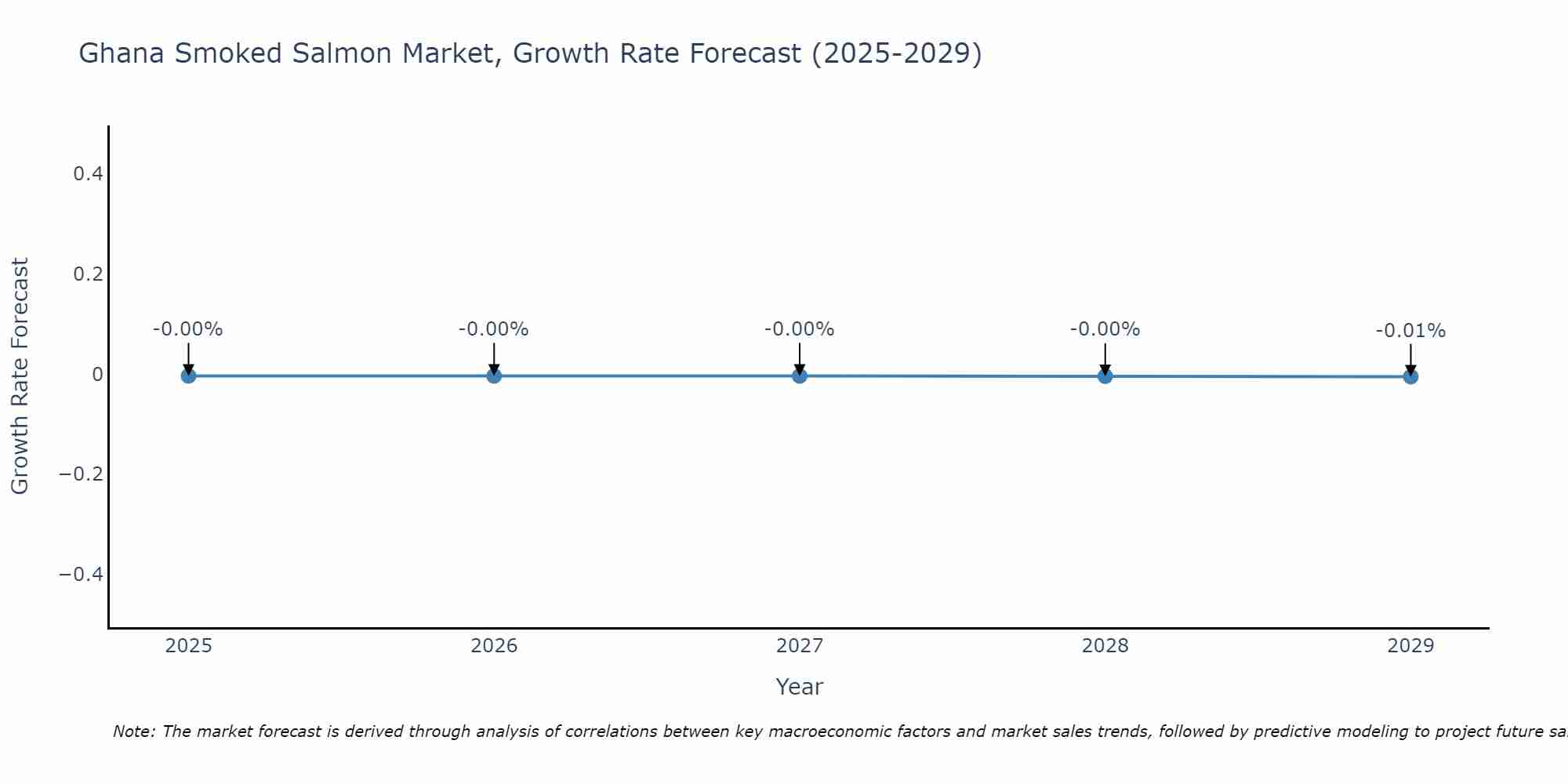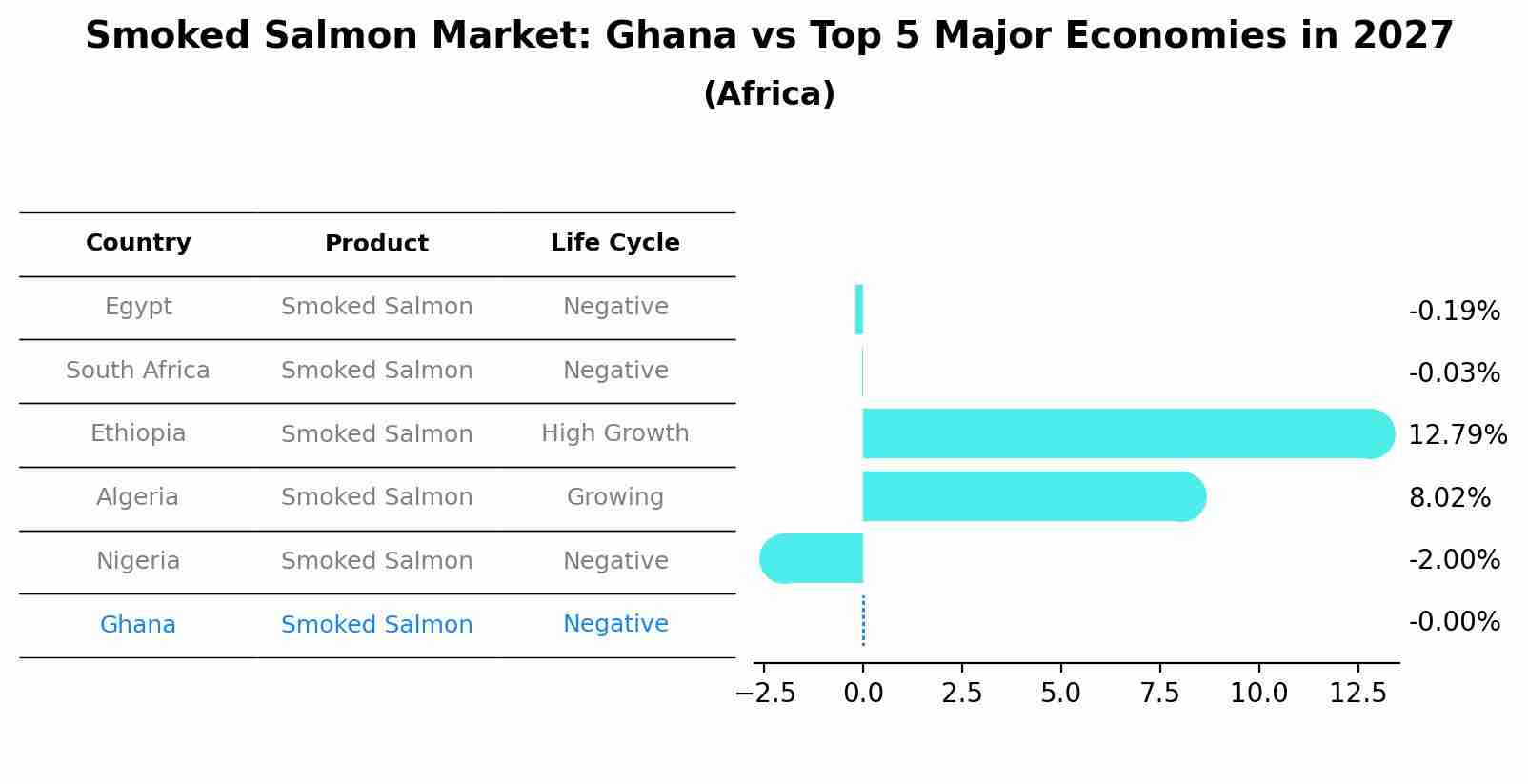Ghana Smoked Salmon Market (2025-2031) Outlook | Size, Industry, Growth, Forecast, Share, Value, Companies, Analysis, Trends & Revenue
| Product Code: ETC387896 | Publication Date: Aug 2022 | Updated Date: Jul 2025 | Product Type: Market Research Report | |
| Publisher: 6Wresearch | Author: Ravi Bhandari | No. of Pages: 75 | No. of Figures: 35 | No. of Tables: 20 |
Ghana Smoked Salmon Market Size Growth Rate
The Ghana Smoked Salmon Market could see a tapering of growth rates over 2025 to 2029. Beginning strongly at -0.00% in 2025, growth softens to -0.01% in 2029.

Smoked Salmon Market: Ghana vs Top 5 Major Economies in 2027 (Africa)
The Smoked Salmon market in Ghana is projected to grow at a negative growth rate of -0.00% by 2027, highlighting the country's increasing focus on advanced technologies within the Africa region, where Egypt holds the dominant position, followed closely by South Africa, Ethiopia, Algeria and Nigeria, shaping overall regional demand.

Ghana Smoked Salmon Market Synopsis
The Ghana Smoked Salmon market is a niche segment within the broader seafood industry, primarily catering to the premium and expat consumer base in urban areas. The demand for smoked salmon in Ghana has been steadily increasing due to a growing middle-class population with higher disposable incomes and a preference for Western cuisine. Local suppliers and importers source smoked salmon mainly from European countries such as Norway and Scotland, ensuring high quality and authenticity of the product. However, the market still faces challenges such as limited awareness among the general population, high pricing compared to other protein sources, and occasional supply chain disruptions. Overall, there is an opportunity for further growth in the Ghana Smoked Salmon market by targeting upscale restaurants, hotels, and gourmet supermarkets while also educating consumers on the benefits and versatility of this premium seafood product.
Ghana Smoked Salmon Market Trends
The Ghana Smoked Salmon market is experiencing a growing trend towards premium and high-quality smoked salmon products. Consumers are increasingly seeking healthier and more diverse food options, leading to a rising demand for smoked salmon as a nutritious protein source. There is also a growing interest in sustainable and ethically sourced seafood products, driving the popularity of smoked salmon from responsibly managed fisheries. Additionally, the influence of global cuisine and food culture has led to a greater appreciation for smoked salmon as a versatile ingredient in various dishes and recipes, further fueling market growth. As a result, manufacturers and retailers in the Ghanaian market are focusing on offering a wider range of smoked salmon products to cater to evolving consumer preferences and capitalize on this trend.
Ghana Smoked Salmon Market Challenges
In the Ghana Smoked Salmon market, there are several challenges that hinder growth and profitability. One major challenge is the high cost of production, including sourcing quality salmon, processing, and packaging, which leads to elevated prices for consumers. Additionally, lack of awareness and a relatively low consumption culture of smoked salmon in Ghana pose a marketing challenge for producers. Distribution and logistics issues also impact the market, with limited cold chain infrastructure affecting the quality and shelf life of the product. Furthermore, competition from other protein sources and imported seafood products present a challenge for domestic smoked salmon producers to differentiate themselves and capture market share. Overall, addressing these challenges through targeted marketing strategies, improved distribution channels, and cost-effective production methods will be crucial for the growth of the Ghana Smoked Salmon market.
Ghana Smoked Salmon Market Investment Opportunities
The Ghana smoked salmon market presents promising investment opportunities due to the growing demand for premium and high-quality seafood products in the region. With an increasing awareness of health benefits associated with consuming seafood, there is a rising trend towards incorporating smoked salmon into the local diet. Investors can capitalize on this trend by establishing or expanding smoked salmon production facilities in Ghana to meet the demand for this niche product. Additionally, leveraging sustainable sourcing practices and certifications such as organic or fair trade can further enhance the market appeal and attract discerning consumers. Collaborating with local fishermen and utilizing Ghana`s abundant marine resources can ensure a steady supply of raw materials for production, creating a sustainable and profitable investment opportunity in the Ghana smoked salmon market.
Jordan Agar Market Government Policies
The Ghanaian government has implemented various policies to regulate the smoked salmon market in the country. These policies focus on ensuring food safety standards, promoting sustainable fishing practices, and supporting local fisherfolk and processors. The Ministry of Fisheries and Aquaculture Development oversees the sector, issuing licenses and conducting inspections to enforce regulations. Additionally, the government encourages investments in modern processing facilities to improve product quality and enhance market competitiveness. Efforts are also made to increase export opportunities for Ghanaian smoked salmon products through trade agreements and market development initiatives. Overall, the government`s policies aim to foster a thriving and sustainable smoked salmon industry that contributes to economic growth and food security in Ghana.
Ghana Smoked Salmon Market Future Outlook
The future outlook for the Ghana Smoked Salmon Market appears promising, driven by increasing consumer awareness and demand for healthier food choices. As the Ghanaian population becomes more health-conscious and embraces Western dietary trends, there is a growing preference for premium seafood products like smoked salmon. Additionally, the rise of urbanization and higher disposable incomes are expected to further boost the market growth. To capitalize on these opportunities, market players can focus on product innovation, sustainable sourcing practices, and strategic marketing campaigns to target the evolving consumer preferences. Overall, the Ghana Smoked Salmon Market is likely to experience steady expansion in the coming years, presenting lucrative opportunities for businesses operating in the seafood industry.
Key Highlights of the Report:
- Ghana Smoked Salmon Market Outlook
- Market Size of Ghana Smoked Salmon Market, 2024
- Forecast of Ghana Smoked Salmon Market, 2031
- Historical Data and Forecast of Ghana Smoked Salmon Revenues & Volume for the Period 2021 - 2031
- Ghana Smoked Salmon Market Trend Evolution
- Ghana Smoked Salmon Market Drivers and Challenges
- Ghana Smoked Salmon Price Trends
- Ghana Smoked Salmon Porter's Five Forces
- Ghana Smoked Salmon Industry Life Cycle
- Historical Data and Forecast of Ghana Smoked Salmon Market Revenues & Volume By Type for the Period 2021 - 2031
- Historical Data and Forecast of Ghana Smoked Salmon Market Revenues & Volume By Vac/Vacuum Packing for the Period 2021 - 2031
- Historical Data and Forecast of Ghana Smoked Salmon Market Revenues & Volume By Vac/Vacuum Packing Covered With Cardboard Envelope for the Period 2021 - 2031
- Historical Data and Forecast of Ghana Smoked Salmon Market Revenues & Volume By Canned Packaging for the Period 2021 - 2031
- Historical Data and Forecast of Ghana Smoked Salmon Market Revenues & Volume By Application for the Period 2021 - 2031
- Historical Data and Forecast of Ghana Smoked Salmon Market Revenues & Volume By Food Service Sector for the Period 2021 - 2031
- Historical Data and Forecast of Ghana Smoked Salmon Market Revenues & Volume By Retail Sector for the Period 2021 - 2031
- Ghana Smoked Salmon Import Export Trade Statistics
- Market Opportunity Assessment By Type
- Market Opportunity Assessment By Application
- Ghana Smoked Salmon Top Companies Market Share
- Ghana Smoked Salmon Competitive Benchmarking By Technical and Operational Parameters
- Ghana Smoked Salmon Company Profiles
- Ghana Smoked Salmon Key Strategic Recommendations
Frequently Asked Questions About the Market Study (FAQs):
- Single User License$ 1,995
- Department License$ 2,400
- Site License$ 3,120
- Global License$ 3,795
Search
Thought Leadership and Analyst Meet
Our Clients
Related Reports
- Afghanistan Apparel Market (2026-2032) | Growth, Outlook, Industry, Segmentation, Forecast, Size, Companies, Trends, Value, Share, Analysis & Revenue
- Canada Oil and Gas Market (2026-2032) | Share, Segmentation, Value, Industry, Trends, Forecast, Analysis, Size & Revenue, Growth, Competitive Landscape, Outlook, Companies
- Germany Breakfast Food Market (2026-2032) | Industry, Share, Growth, Size, Companies, Value, Analysis, Revenue, Trends, Forecast & Outlook
- Australia Briquette Market (2025-2031) | Growth, Size, Revenue, Forecast, Analysis, Trends, Value, Share, Industry & Companies
- Vietnam System Integrator Market (2025-2031) | Size, Companies, Analysis, Industry, Value, Forecast, Growth, Trends, Revenue & Share
- ASEAN and Thailand Brain Health Supplements Market (2025-2031) | Strategy, Consumer Insights, Analysis, Investment Trends, Opportunities, Growth, Size, Share, Industry, Revenue, Segments, Value, Segmentation, Supply, Forecast, Restraints, Outlook, Competition, Drivers, Trends, Demand, Pricing Analysis, Competitive, Strategic Insights, Companies, Challenges
- ASEAN Bearings Market (2025-2031) | Strategy, Consumer Insights, Analysis, Investment Trends, Opportunities, Growth, Size, Share, Industry, Revenue, Segments, Value, Segmentation, Supply, Forecast, Restraints, Outlook, Competition, Drivers, Trends, Demand, Pricing Analysis, Competitive, Strategic Insights, Companies, Challenges
- Europe Flooring Market (2025-2031) | Outlook, Share, Industry, Trends, Forecast, Companies, Revenue, Size, Analysis, Growth & Value
- Saudi Arabia Manlift Market (2025-2031) | Outlook, Size, Growth, Trends, Companies, Industry, Revenue, Value, Share, Forecast & Analysis
- Uganda Excavator, Crane, and Wheel Loaders Market (2025-2031) | Strategy, Consumer Insights, Analysis, Investment Trends, Opportunities, Growth, Size, Share, Industry, Revenue, Segments, Value, Segmentation, Supply, Forecast, Restraints, Outlook, Competition, Drivers, Trends, Demand, Pricing Analysis, Competitive, Strategic Insights, Companies, Challenges
Industry Events and Analyst Meet
Whitepaper
- Middle East & Africa Commercial Security Market Click here to view more.
- Middle East & Africa Fire Safety Systems & Equipment Market Click here to view more.
- GCC Drone Market Click here to view more.
- Middle East Lighting Fixture Market Click here to view more.
- GCC Physical & Perimeter Security Market Click here to view more.
6WResearch In News
- Doha a strategic location for EV manufacturing hub: IPA Qatar
- Demand for luxury TVs surging in the GCC, says Samsung
- Empowering Growth: The Thriving Journey of Bangladesh’s Cable Industry
- Demand for luxury TVs surging in the GCC, says Samsung
- Video call with a traditional healer? Once unthinkable, it’s now common in South Africa
- Intelligent Buildings To Smooth GCC’s Path To Net Zero


















